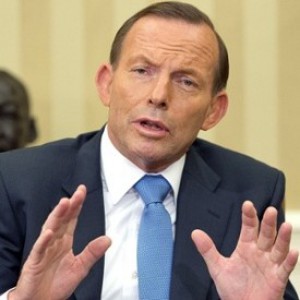Tony Abbott: 'disputed' East Jerusalem merely a clarification

Tony Abbott has sought to play down the backlash over Australia's decision to refer to East Jerusalem as “disputed” rather than “occupied” territory, saying the government had made only a “terminological clarification”.
The prime minister said the government had made no change in policy and strongly supported a two-state solution. But he acknowledged it was an “extremely sensitive” topic and said the foreign affairs minister, Julie Bishop, would meet ambassadors of countries that had raised objections.
Representatives of 18 nations, including Indonesia, protested against the decision to Australia's Foreign Affairs Department, with the head of the general delegation of Palestine to Australia, Izzat Abdulhadi, warning it would “unfortunately” influence trade between Australia and the Arab world.
The National Farmers’ Federation also called for “sensibilities to prevail” amid concerns the “unfortunate hiccup” over the Israel-Palestine dispute could affect trade.
The change of language was first revealed earlier this month by the attorney general, George Brandis. He told a Senate estimates committee the term “occupied” East Jerusalem was “freighted with pejorative implications which is neither appropriate nor useful” and Australia would not “describe areas of negotiation in such judgmental language”.
Abbott addressed the controversy when he faced the media in Houston, Texas, on the last leg of his trip to North America.
“There has been no change in policy – absolutely no change in policy,” he said.
“There's been a terminological clarification. We absolutely refuse to refer to occupied East Jerusalem. That was what the argument between senator Brandis and the Greens was all about but there has been no change in policy – simply a terminological clarification.
“We strongly support a two-state solution. We continue to support [United Nations] resolutions 242 and 338. We are giving, I think, $56m in aid this year to Palestine.”
UN security council resolution 242, adopted in November 1967, called for the withdrawal of Israel’s armed forces “from territories occupied in the recent conflict” and recognition of the right for all to live in peace “within secure and recognised boundaries free from threats or acts of force”.
Abbott played down the potential for Australia’s position to affect trade but acknowledged the language surrounding the issue attracted strong views.
“Look, this is an area where people are inevitably extremely sensitive. My understanding is that there have been some discussions between some ambassadors in Canberra and the department,” Abbott said.
“My understanding is that there is going to be a meeting between some of the ambassadors and foreign minister Bishop in a couple of days' time. We are very happy to clarify the position, and on trade, people trade with us because we are a good trading partner. They trade with us because we are a good trading partner and nothing that has happened in the last couple of days could detract from that.”
Abbott did not directly answer a question as to whether the cabinet had discussed the issue before Brandis announced the decision.
“If I may say so, you are trying to make more than there is about this,” Abbott told reporters.
The trade minister, Andrew Robb, said he had not been consulted about the issue.
“I wasn't aware of it, no, but I think George [Brandis] was looking to just clarify the situation,” Robb told Sky News on Sunday. “He must have found himself and others in the course of government business using different terms to describe that part of Jerusalem and George sought to get some clarity on it.”
Pressed on the negative reaction from trading partners, Robb said the comments had been misinterpreted.
“They seemed to assume that there'd been some change in our attitude to Palestine and the Jewish state and the two-state solution and I think once it's clarified that our position on Israel has not changed one iota then hopefully this issue will pass,” Robb said.
Bishop told the Ten Network there was “no change in government policy”.
“We support a two-state solution where Israelis and Palestinians can live in peace behind internationally recognised boundaries,” the foreign affairs minister said during an interview on the Bolt Report on Sunday.
“What we won't do is pre-empt the final status negotiations that are part of the peace negotiations, and so what attorney general George Brandis did was state the fact that the Australian government does not refer to East Jerusalem by any name other than East Jerusalem.
“This is a complete and utter overreaction by Labor.”
The opposition leader, Bill Shorten, said on Friday the government should “think first and talk second” in diplomatic relations.
“Foreign affairs and diplomatic relations require cool heads and sensible comments, not just changing protocols or making sudden announcements, so that’s my concern,” Shorten said.
The deputy Labor leader, Tanya Plibersek, has previously accused Brandis of “freelancing on foreign policy” and ditching an expression that had been “used by Coalition governments from the 70s, the 80s. It’s been used in a bipartisan way; it’s been used around the world.”
The former Labor foreign affairs minister Bob Carr accused the government of siding “with the religious, ethno-nationalist right of Israeli politics”.
Daniel Hurst, Guardian Australia political correspondent